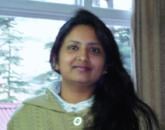
In my childhood days, I was friends with a girl in the neighbourhood who would secretly nibble on ash chips from the small mud ‘choolah’ in her backyard. She would encourage me to taste some of the ash, saying it was very flavourful, but I never found the inclination to do so. A few years later, as a 10-year-old, I happened to taste some ‘vibhuti’, the sacred ash smeared on the forehead in religious ceremonies, and I found that I quite enjoyed the taste. Though, at no point, I must quickly add, did I become addicted to it or had it on the sly.
Many friends of mine are mothers who complain that their toddlers eat mud, and that their kids in primary school eat nasty nose filth that they call ‘nosey’. Parents are often angry and frustrated when their kids eat ‘dirty’ non-food items, which may seriously endanger their health. Children are often yelled at, threatened and punished direly for their ‘dirty habits’, but in vain. A child faced with an aggressive parent, only gets smarter about hiding his or her eating disorder.
I also remember a boy in school, (in class 4) who completely chewed up an entire new pencil everyday. When our teacher took away all his stationery from him, he started sucking on his thumb so badly that he later had thumb sores.
Coal, faeces, chalk, glass, hair, blood, etc. are other items that may be consumed by children and even adults afflicted with an eating disorder. Adult patients of this disorder are typically pregnant women and the developmentally disabled. The name for this malady – the habitual consumption of harmful and non-food items – is Pica.
So, what should one do if a child or an adult in the family is suffering from Pica? A well-rounded approach towards treatment seems to be the answer. This would include physical, psychological, environmental, and family assistance.
Firstly, a child should undergo medical screening for anemia, lead poisoning, and parasites. The child and his or her parents should attend behavioural counselling and learn the difference between food and non-food items. The parents must talk to the child and help him against eating offensive items by placing lemon or ammonia on the non-food item. They must coach the kid to exercise physical restrain during cravings. Parents can guide children to associate negative consequences with eating non-food products, and positive reactions when eating normally. They may also use child-safety locks and high shelving to keep non-food items away. A psychiatrist may be able to assist by prescribing medicines to reduce the eating behaviour if it is the result of a developmental disorder. In any case, the solution is to find out the environmental cause or the situation that encourages Pica.

Comments should be on the topic and should not be abusive. The editorial team reserves the right to review and moderate the comments posted on the site.
Sir she dont take junk foods.What is prebiotic?